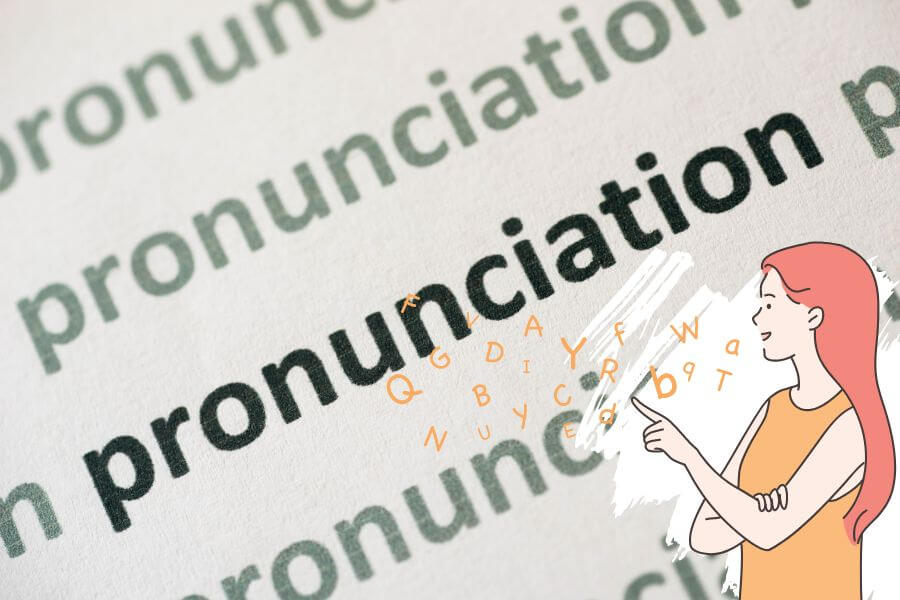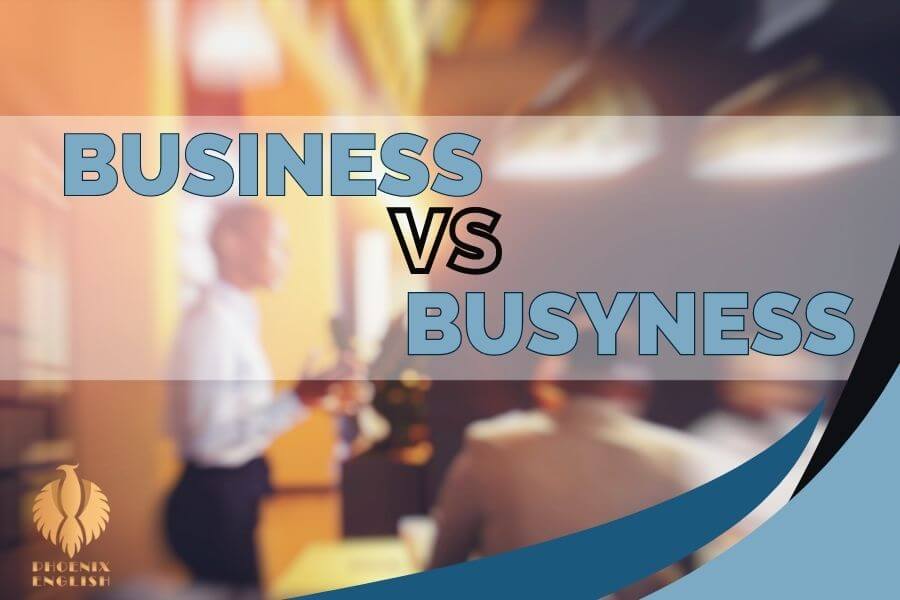Hello dear learners. Hope you are enjoying learning English online. In today’s lesson I am going to teach you a very interesting subject.
Do you know the difference between business and busyness? Well, this subject may sound confusing at first. But let’s investigate the meaning of each of these two words to find out their difference.
Let’s start by studying the definition of each word. The pronunciations and examples of the use of each word is provided as well for you.
Don’t miss our new video about “business” vs “busyness” – watch now!
Definitions and Examples
Business (noun) /ˈbɪz.nɪs/
Meaning: The activity of buying and selling goods and services
Examples:
My brother’s in business.
He’s in the frozen food business.
Our firm does a lot of business with overseas customers.
Eventually they found a consultant they felt they could do business with (= with whom they could work well).
Currently, there are fewer firms in business (= operating) in the area than ever before.
This new tax will put a lot of small firms out of business (= they will stop operating).
She set up in business (= started her own company) as a management consultant.
Synonyms for “business”
Synonyms for the word “business” include:
commerce
enterprise
trade
Busyness (noun) /ˈbɪz.i.nəs/
Meaning: the fact of working hard or giving your attention to a particular thing
Examples:
Some of us can handle more busyness and activity than others.
I’m exhausted from the intense busyness of work over the past couple of months.
I hope my busyness is temporary and once my dissertation is finished I’ll have time to relax.
There is too much busyness in schools.
Anyone fond of the town’s sleepy atmosphere may resent the busyness that the new townhouse developments will bring.
A review of public hospitals found many barriers to care provision including the busyness of postnatal wards.
Synonyms for “busyness”
synonyms for the word “busyness” include:
Liveliness
Activity
Attentiveness
Vivacity
Hustle
Grammatical points

As you may know, the suffix “ness” is a noun-maker. It attaches to the end of an adjective and makes a noun out of it.
When this suffix attaches to the end of a word that ends with “y”, the “y” is transformed into “i”. When “ness” is attached to the end of the word “busy” to make a noun out of it, it normally changes into “business”.
But the problem is that “business” is a different word with a completely different meaning. Therefore, we use the word “busyness” to talk about the busy nature of a situation and the word “business” to mention a job. Notice that “business” also means a company or firm.
More about the words

“Busyness”
The word “busyness” means the state of being busy, having a lot of things to do, lots of responsibilities and tasks and scheduled activities.
“Busyness” is not a very common word like “business”, but you’ll sometimes hear or see it in some situations and contexts. For example, you can say, “I took a vacation to take a break from the busyness of everyday life”.
Or imagine that you are a college student and you have very intense few weeks at the end of the semester.
So, you might not have much time to hang out with your friends during the busyness of final exams; you have a lot of things to do, big assignments and studying for all those exams.
As another example, imagine a company that sells holiday decorations like Christmas lights. Most of their sales are going to be made in December. So, they may start preparing for the busyness of the holiday season from November.
In this example, we can say that the business (that company) is preparing for a season of busyness (having a lot of things to do).
“Business”
The word “business”, on the other hand, is a more common word that you hear or see a lot. Business generally refers to a person’s occupation or job.
For example, a person might say, “Business is good” to indicate that their sales are increasing. The word business can be used in several other contexts as well.
1. a person’s regular occupation, profession, or trade.
Example: “She had to do a lot of smiling in her business”
2. the practice of making one’s living by engaging in commerce.
Example: “The jewelry business”
“Business” is also defined as making one’s living through commerce in a particular field.
For example, you might have a friend or colleague in the insurance business. In this case, business refers to the job by which the person makes a living.
Pronunciation

The pronunciation of these two words is very similar but actually they have a very small and at the same time very important difference.
The word “business” which is spelled /ˈbɪz.nɪs/ has two syllables. However, the word “busyness” which is spelled /ˈbɪz.i.nəs/ has three syllables.
Etymology

Now let’s look at the etymology of the word “business” which has been taken from www.etymonline.com.
business (n.)
Old English bisignes (Northumbrian) “care, anxiety, occupation,” from bisig “careful, anxious, busy, occupied, diligent”.
The original sense is obsolete, as is the Middle English sense of “state of being much occupied or engaged” (mid-14c.), the latter replaced by busyness. The modern two-syllable pronunciation is from 17c.
The sense of “a person’s work, occupation, that which one does for a livelihood” is recorded late 14c. (in late Old English bisig appears as a noun with the sense “occupation, state of employment”).
The sense of “that which is undertaken as a duty” is from late 14c. The meaning “what one is about at the moment” is from 1590s. The sense of “trade, commercial engagements, mercantile pursuits collectively” is attested by 1727, on the notion of “matters which occupy one’s time and attention.”
Business card is attested from 1840; business letter from 1766. Business end “the practical or effective part” (of something) is American English, by 1874. Phrase business as usual attested from 1865.
To mean business “be intent on serious action” is from 1856. To mind (one’s) own business “attend to one’s affairs and not meddle with those of others” is from 1620s.
As you see in the above quotation from www.etymonline.com, the word “business” has taken its meaning from “busyness” which means the state of being busy.
Sample context
In the following, I have provided a text for you that includes both of these words so that you understand their usage in context even better. The text has been taken from www.economictheories.org:
“All real estate agents have a choice—they can either be in business or in “busyness.” Most are in busyness.
Why? Their time is not focused on what really must be done to drive their business at a big level.
They are not clear about their models, so they are not clear about the activities and priorities on which they should focus their time. Millionaire Real Estate Agents are just the opposite.
They don’t have a “to do” list—they have a “have to” list. Through time blocking, they make sure that the “have to” gets done before the “to do.”
They know what has to happen, and, at the beginning of each year, month, week, and day, they open their calendar and “block off” the appropriate amount of time to get those things done.
Everything else—their “to do” list—gets scheduled after and around the “have to” activities.”
Concluding note
So, today we read about the differences between “business” and “busyness”. We learned their meanings and pronunciations.
We also read example sentences and a sample context to learn their usage better. Hope you enjoyed this lesson today.
Try to make sentences with these two words to understand their meanings and usages better. And visit my page for more interesting English lessons.
Frequently Asked Questions
1. Q: What is the difference between “business” and “busyness”?
A: The primary difference between “business” and “busyness” lies in their meanings and implications. “Business” typically refers to an organized activity or enterprise aimed at making a profit, encompassing everything from small businesses to large corporations.
It is associated with goals, strategies, and results. On the other hand, “busyness” refers to the state of being busy, often implying a lack of focus or inefficient use of one’s time. It emphasizes activity over productivity. For example, a business might have clear objectives and measurable outcomes, while someone might be busy attending countless meetings with no clear purpose.
2. Q: Why is it important to distinguish between business and busyness?
A: Distinguishing between business and busyness is essential because it helps individuals and organizations prioritize effectively. Recognizing the difference can lead to better time management, ultimately enhancing productivity. A focus on productive business practices helps in achieving goals, while an excess of busyness can lead to burnout and reduced efficiency.
For instance, a manager who prioritizes strategic planning (business) over simply answering emails all day (busyness) is more likely to lead their team to success.
3. Q: How can one identify when they are being busy versus being productive in their business?
A: Identifying the difference between being busy and being productive involves assessing the outcomes of one’s actions. Are the tasks completed aligned with long-term goals?
Productive efforts yield tangible results, such as meeting deadlines, completing projects, or securing clients, while busyness may manifest as a full schedule filled with low-priority tasks. For example, spending hours on social media updates (busyness) is often less impactful than focusing on developing a new product (business).
4. Q: What are some common pitfalls of busyness in the workplace?
A: Common pitfalls of busyness in the workplace include scattered focus, decreased morale, and inefficiency. Employees might feel pressured to appear busy, leading to a culture of activity rather than effectiveness.
Additionally, busyness can lead to poor decision-making and increased stress levels, as individuals manage workloads that do not contribute to business goals. For example, a team might spend excessive time on irrelevant projects rather than concentrating on key performance indicators.
5. Q: Can busyness be beneficial in any way?
A: While excessive busyness is generally counterproductive, structured busyness can help create momentum and identify areas for improvement. Engaging in various activities might clarify priorities and highlight tasks that align better with business goals.
For example, attending multiple networking events might feel busy but could lead to valuable connections that directly benefit the business.
6. Q: How can business leaders encourage a balance between business and busyness among their teams?
A: Business leaders can foster a balance between business and busyness by setting clear objectives, promoting effective time management, and encouraging prioritization of tasks.
This might involve regular check-ins to assess workloads, utilizing project management tools to streamline tasks, and emphasizing the importance of strategic initiatives over mere activity. For instance, a manager might help their team set weekly goals that align with overall business objectives rather than allowing them to become overwhelmed with daily tasks.
7. Q: What strategies can individuals employ to shift from a state of busyness to focused business activities?
A: Individuals can shift from busyness to focused business activities by implementing time management techniques such as priority lists, time blocking, and the Pomodoro Technique. Identifying high-impact tasks and dedicating focused time slots to complete them without distractions fosters productivity.
For example, a freelancer might set aside two hours each morning for client work, avoiding interruptions during that time, thus transforming a chaotic schedule into a structured productive pattern.
8. Q: How does busyness affect employee morale and job satisfaction?
A: High levels of busyness can negatively affect employee morale and job satisfaction by fostering feelings of overwhelm and stress. When employees feel constantly busy without achieving meaningful results, it can lead to burnout and decreased engagement.
Conversely, a focused work environment that emphasizes business outcomes can enhance satisfaction and morale, as employees see the direct impact of their efforts. For example, employees involved in goal-oriented projects may feel a greater sense of accomplishment compared to those caught in endless meetings.
9. Q: Are there specific industries more prone to busyness than others?
A: Certain industries, such as fast-paced environments like advertising, information technology, and sales, are often more prone to busyness due to high demands and tight deadlines.
The culture within these sectors can sometimes prioritize appearance over actual productivity, leading to staff being overworked and stressed. For instance, tech startups may emphasize rapid development cycles, pushing employees into a state of busyness that hinders meaningful progress.
10. Q: How can technology help to distinguish between business and busyness?
A: Technology can aid in distinguishing between business and busyness through productivity tools that track progress and outcomes.
Project management platforms, time tracking software, and communication tools can help streamline work processes, ensuring that tasks are prioritized according to their contributions to business goals. For example, tools like Asana or Trello can help teams visualize tasks and focus on what truly impacts business growth rather than merely filling their time.
11. Q: What role does goal-setting play in separating business from busyness?
A: Goal-setting is crucial in creating clarity and direction, distinguishing between productive business activities and mere busyness.
Clear, measurable goals guide decision-making and prioritization, helping individuals focus on tasks that drive results. For example, a salesperson who sets a goal to increase revenue by 20% will prioritize client meetings and outreach strategies over less impactful administrative tasks.
12. Q: How can small businesses prevent falling into the trap of busyness?
A: Small businesses can prevent falling into busyness by establishing a clear business plan, setting specific objectives, and developing a culture that values output over mere activity.
Regular reviews and feedback sessions encourage team members to reflect on their performance and focus on actionable strategies rather than engaging in repetitive, low-impact activities. For instance, a small café could implement weekly meetings to assess their sales strategies and identify effective promotional tactics.
13. Q: How can mindfulness practices contribute to reducing busyness?
A: Mindfulness practices can help individuals become more aware of their work habits, allowing them to recognize when they are busy without being productive.
Techniques such as meditation, deep breathing exercises, and regular breaks can promote a sense of calm and clarity, enabling individuals to refocus on meaningful tasks. For example, incorporating a five-minute mindfulness session before meetings can help participants concentrate on essential topics rather than being distracted by numerous trivial issues.
14. Q: What is the impact of busyness on long-term business growth?
A: Busyness can negatively impact long-term business growth if it detracts from strategic planning and innovation. A focus on completing tasks without reflecting on their importance can lead to stagnation and missed opportunities.
In contrast, businesses that prioritize strategic initiatives and innovation are more likely to adapt and grow over time. For instance, a company that dedicates time to research and development rather than scrambling to meet deadlines may discover new products or services that enhance their market position.
15. Q: How can individuals create a personal philosophy that emphasizes business over busyness?
A: Individuals can develop a personal philosophy that emphasizes business over busyness by defining their values, purpose, and long-term objectives. Regularly reflecting on what truly matters helps guide daily choices, ensuring that time is invested in initiatives that align with personal and professional aspirations.
For example, someone might create a vision board highlighting their goals, enabling them to focus on relevant activities that advance their interests.
16. Q: What are the signs that someone is stuck in a cycle of busyness?
A: Signs that someone is stuck in a cycle of busyness include feeling constantly overwhelmed, neglecting essential tasks, lacking progress towards goals, and experiencing chronic stress. They may be working long hours without achieving significant results or frequently shifting priorities without clarity.
For instance, a project manager who spends their days responding to emails and attending meetings without completing key deliverables is likely caught in busyness.
17. Q: How can companies measure the effectiveness of their business practices versus busyness?
A: Companies can measure the effectiveness of their business practices compared to busyness through key performance indicators (KPIs), feedback from employees, and analysis of project outcomes.
Regular assessments of productivity, staff engagement, and project success rates help identify what actions contribute to business goals and what simply represents busyness. For instance, tracking sales performance against time spent on training could reveal areas of inefficiency.
18. Q: What role does communication play in addressing business versus busyness?
A: Effective communication is vital in addressing the distinction between business and busyness. Leaders should communicate clear expectations, set priorities for teams, and encourage open dialogue about workloads and productivity challenges.
Regular updates help ensure everyone is aligned with business objectives and minimize misunderstandings that can lead to unnecessary busyness. For example, a company that holds weekly team check-ins can facilitate discussions on priorities and challenges, fostering a culture focused on meaningful work.
19. Q: Can networking contribute to both business success and potential busyness?
A: Networking can certainly contribute to business success by helping individuals develop valuable relationships, share knowledge, and uncover new opportunities. However, if not managed properly, it can lead to busyness when individuals engage in excessive networking activities without a clear purpose or follow-up plan.
Striking a balance involves intentional networking where connections genuinely contribute to business growth. For instance, attending a conference with clear goals and set follow-up actions is far more effective than aimlessly collecting business cards.
20. Q: How can an organization foster a culture that prioritizes business over busyness?
A: An organization can cultivate a culture prioritizing business over busyness by encouraging thoughtful planning and strategic focus across all levels. This includes promoting a work-life balance, recognizing achievements tied to business goals, and regularly evaluating processes to eliminate unnecessary tasks.
Training sessions on time management and empowerment in decision-making can also support a culture that values meaningful contributions rather than mere activity. For example, recognizing teams that achieve project milestones reinforces the importance of outcomes over busywork.

Hi, welcome to my blog! My name is Omid and I am thrilled to have you here! I am an English language teacher with 12 years of experience and hold multiple international certifications (TESOL, IELTS, TOEFL, PTE, CELTA). Additionally, I hold a PhD in Applied Linguistics with a specialization in Teaching English as a Second Language (TESL), which fuels my passion for teaching English and assisting others in mastering the language. To me, nothing is more rewarding than helping individuals enhance their English language abilities through various methods. So, let’s embark on this journey of learning English together.




